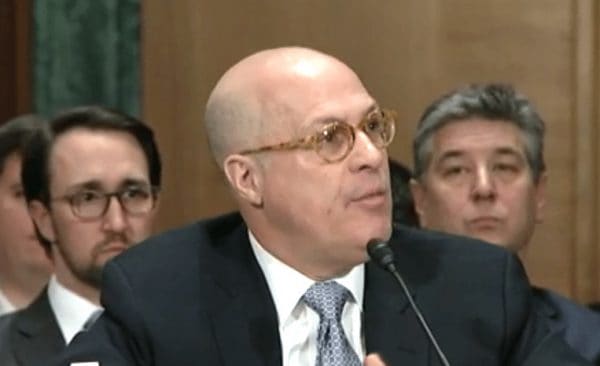Speaking at Vanderbilt University Law School this past week, Commodities Futures Trading Commission (CFTC) Chairman J. Christopher Giancarlo made some interesting comments. Giancarlo, a Commodore Alum, spoke about the digitization of finance (Fintech) and the subject of virtual currencies. Giancarlo reflected on time spent with younger relatives over the holiday season, explaining his evolving perspective on cryptocurrencies and his vision for regulation;
“… during our New Year’s ski vacation with my kids, nieces and nephews – all Millennials and GenZers. I spent time online reading blogs and watching videos about virtual currencies. The more I watched, the more I saw that the energy and momentum behind virtual currencies was not just driven by technological innovation. There was something else going on – something cultural … The new generation of Millennials and GenZ sees generational change driven by technological disintermediation of distrusted institutions. They see virtual currency – along with social media – as a means to bypass control by a failed generation of leadership.”
Giancarlo’s engagement with the generation that has embraced Bitcoin and other digital currencies helped to craft his opening remarks at the widely watched Senate hearing on cryptocurrencies and initial coin offerings (ICOs) where Giancarlo presented alongside his peer SEC Chair Jay Clayton. His appearance and comments helped to launch Giancarlo as a popular policy leader in the cryptocurrency world.
Nothing better then getting out on the slopes with my two sons pic.twitter.com/yeG8FmFpjh
— Chris Giancarlo (@giancarloCFTC) December 30, 2017
Following the Senate Committee hearing, securities Attorney Jesse Overall, a Contributor to CI, wrote about the differences between the SEC and the CFTC. Calling it a “tale of two cities,” Overall said Giancarlo’s approach was both philosophically and practically very different from that taken by Clayton – in significant ways. This policy disparity was highlighted once again at the Vanderbilt speech as Giancarlo tackled about the incumbent regulatory challenges.
 CI touched base with Overall for his perspective on the presentation in Nashville. Overall said;
CI touched base with Overall for his perspective on the presentation in Nashville. Overall said;
“Chairman Giancarlo’s speech on cryptocurrency at Vanderbilt University last week contained some interesting observations. He commented on his “new found fame” following his testimony at the Senate hearing on cryptocurrency and ICO regulation earlier this year and clarified that he is not a crypto evangelist. Most importantly, Chairman Giancarlo reaffirmed his view that, in response to profound technology-driven changes in the markets it regulates, such as the advent of virtual currency, the CFTC should generally follow a flexible, principles-based regulatory approach focused on specifying desired outcomes while leaving the choice of means and a greater degree of initiative to registrants and market participants, in keeping with the CFTC’s historical character as a regulatory agency.”
Giancarlo’s fame has been symbolized by the fact that following the Senate hearing his Twitter followers ballooned by tens of thousands of crypto enthusiasts who dubbed him #CryptoDad and #FUDBuster. (His Twitter followers now stand at around 50,000)
But as Overall states, Giancarlo is not blindly following the crypto-rave party. He is very aware of the fraudsters, scams, and criminals, that have populated the initial coin offering (ICO) market – even while legitimate purposes emerge for digital assets. Giancarlo stated;
“The cryptocurrency universe sadly contains a large share of get rich quick schemers, shady entrepreneurs and transactions in illegal goods. It also appears to have a growing contingent of professional, institutional users. Yet, it is also favored by advocates for the poor and unbanked, libertarians, pacifists, Occupy Wall Streeters, earnest tech geeks, economics buffs, long-term investors and many, perhaps naïve, but well-meaning young people.”
 So how can the CFTC foster an ecosystem of innovation in a world where securities are guided by rules created before computers existed (or the iPhone for that matter)? For Giancarlo, and the CFTC in general, it is vital to be a principles based regulator – in contrast to the current SEC approach that has chosen to channel digital assets into established securities exemptions and rules.
So how can the CFTC foster an ecosystem of innovation in a world where securities are guided by rules created before computers existed (or the iPhone for that matter)? For Giancarlo, and the CFTC in general, it is vital to be a principles based regulator – in contrast to the current SEC approach that has chosen to channel digital assets into established securities exemptions and rules.
“The relentless advance of technology and evolution of market structure requires a flexible, principles-based approach to oversight of some of the world’s most dynamic commodity and financial derivatives markets,” said Giancarlo. “When it comes to the challenge of crypto, it is clear that our governing statutes were not designed for this technology. The CFTC’s governing law, the Commodity Exchange Act (CEA), was first passed in 1936 and has been amended several times since then. Unsurprisingly, it contains no reference to virtual currencies. It is like an old computer operating system that struggles to support this new and complex application. In the absence of a legislative update, existing law and regulation must be interpreted on the basis of core principles to keep pace with technological change.” [emphasis added]
[clickToTweet tweet=”‘When it comes to the challenge of crypto, it is clear that our governing statutes were not designed for this technology,’ CFTC Chair J. Christopher Giancarlo #Cryptocurrency” quote=”‘When it comes to the challenge of crypto, it is clear that our governing statutes were not designed for this technology,’ CFTC Chair J. Christopher Giancarlo #Cryptocurrency”]
Giancarlo believes in the transformative nature of technology and the need for rules to keep up with the times. “It is part of keeping faith with new generation of market participants,” Giancarlo stated. Flexibility is demanded – instead of a one size fits all rigid path. While some believe tokenized offerings are just more of the same, Giancarlo obviously is of the opinion that digital assets are more than a flash in the pan. Perhaps it is time for a 2020 Act to replace the securities laws from the last century?
“In the Chairman’s view, such an approach is more adaptive and forward-looking than a prescriptive regime that would mandate compliance with detailed rules, given that virtual currencies did not exist when such rules would have been written,” added Overall.
[clickToTweet tweet=”Perhaps it is time for a 2020 Act to replace the securities laws from the last century? #Cryptocurrency #Fintech” quote=”Perhaps it is time for a 2020 Act to replace the securities laws from the last century? #Cryptocurrency #Fintech”]



